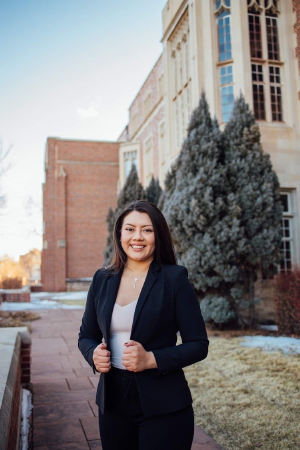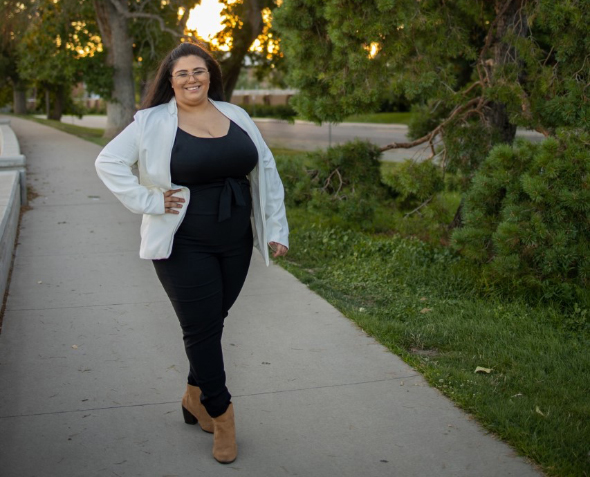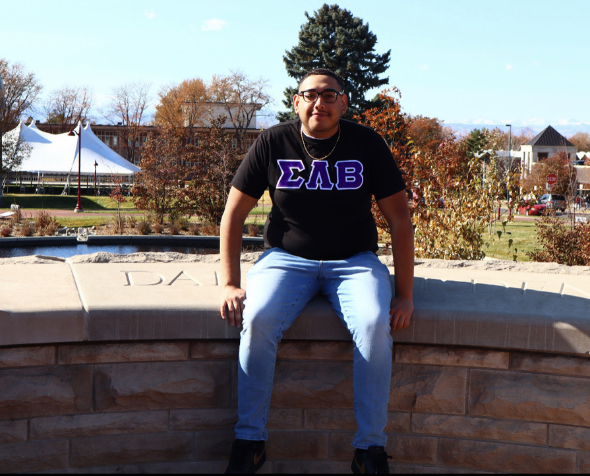First-Generation Student Paves the Way for the Future
As a first-generation student at the University of Denver, senior Angelica Granados found that navigating the unknown college experience could be difficult at times, but she never lost her excitement for attending her top-choice university. She received a scholarship from the Access and Transitions program at DU, allowing her to pursue her studies and become involved with several community programs.
In addition to majoring in political science and Spanish and minoring in sociology and critical, race & ethnic studies, Granados cheerleads with Denver Athletics, joined Volunteers in Partnership (VIP) — whose motto is “students helping students” — and served for three years as a Resident Assistant (RA), one of her proudest accomplishments.
“When I ended up being an RA for first-generation students, it was really awesome to be able to help guide the students, change their perspectives on school spirit, help them be more involved, and not feel excluded on campus,” says Granados.
Being an RA not only helped her residents grow and find community but helped Granados to gain confidence in herself and her interactions with the DU community.
“The RA role really helped me get out of my shell on campus. It allowed me to fight my imposter syndrome and interact with people I didn’t feel comfortable or couldn’t see a commonality with,” says Granados. “I was in very deep culture shock at the time, and so I told myself by taking on the RA position that I’d have to interact with people who didn’t look like me completely or who had different views, ultimately helping me participate more in class.”
Granados’s family is from Mexico but she grew up in southwest Denver, about fifteen minutes away from DU. Through the VIP Program, Granados returns to her community regularly to mentor high school students who are considering applying to college.
“We do programs such as summer link to college where we bring sophomore high schoolers onto campus and show them how it would be to go to college. We also go back to our high schools and help kids apply for college,” says Granados.
As a student in the College of Arts, Humanities & Social Sciences, Granados has taken every opportunity she can to learn more from her professors. Associate Professor of History Liz Escobedo and Visiting Teaching Assistant Professor in Media, Film & Journalism Studies Johnny Ramirez have been especially impactful and supportive of her.
“Professor Escobedo has been my go-to person for anything that I need in the sense of majors, transitional experiences, challenges of college, or any experiences that I was going through,” says Granados. “Professor Johnny has been a person that I can relate to. He’s very culturally aware about his experiences as a brown man, especially on DU’s campus and in higher education in general, and his being a part of our ethnic studies program has really made me feel like it’s the real deal.”
Even with all the support, attending DU hasn’t come without its challenges. Granados has continually found herself trying to balance being an advocate for students of color with acknowledging the flaws of the University.
“I have a lot of school spirit, and I think it’s been important for me to not only see myself as a person of color on campus, but as a DU student. It’s been very important for me to immerse myself in anything DU and do so unapologetically. And I think that’s something that I’ve challenged my community with — to be more open and embrace being where you’re at,” says Granados. “I feel like I understand a lot of the things we have to work on as an institution, but I also am very thankful and grateful for the opportunity to go here.”
After graduation, Granados hopes to take her experiences and knowledge to law school where she can bring tangible change to her southwest Denver community. She’s paving the way for future generations and feels the excitement in her younger siblings who look to her as an example.
“For me it was always ‘If I go to college, if I can afford it.’ With my being in college and so involved, my siblings know that college is an expectation in my family now. It’s been very monumental for me to have that influence.”






